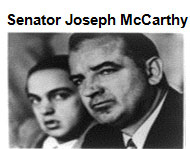
Source: McCarthy photo, Library of Congress
As the United States was locked in a political battle against the Soviet Union on the global front, a similar war was being waged on the American home front. After World War II ended, the fear of communism gripped the United States.
The rivalry between the democratic ideals of the United States and the communist ideology of the Soviet Union was evident in conflicts across the globe. When communist-backed North Korea invaded South Korea, the United States became involved, mainly to stop the spread of communism. The United States’ involvement in this conflict intensified the fear of Americans at home about the spread of communism.
Soon, Americans grew suspicious and fearful of anyone suspected of having ties to the Soviet Union. There were concerns that communists and those sympathetic to their ideologies in the United States might be spies. This growing fear was called the “Red Scare.” The federal government played a key role in the attempt to quell the fears of Americans. There was concern that spies were in the American government. In March 1947, President Harry S. Truman took steps to determine the loyalty of federal employees. Truman issued Executive Order 9835, which allowed all federal employees to be investigated to determine their loyalty to the U.S. government.
The federal government took further steps to find communists among the American people. In 1950, the House Un-American Activities Committee (HUAC) investigated alleged communist activities. The scope of HUAC, however, reached beyond the federal government employees. HUAC doggedly targeted celebrities and political figures, too. Celebrities who refused to answer questions were blacklisted and unable to work in the entertainment industry for years to come.

Source: McCarthy photo, Library of Congress
U.S. Senator Joseph McCarthy of Wisconsin capitalized on this atmosphere of fear and suspicion. Senator McCarthy used extreme tactics of intimidation and unfounded public accusations to hunt for communists in America. He boasted of having the names of more than 200 federal employees or office holders who were communists. His unfounded accusations caused even more hysteria.
For nearly five years, McCarthyism ran rampant as more people were accused of communist activities. McCarthy headed a senate committee that conducted numerous hearings, where McCarthy viciously interrogated and attacked witnesses. Anyone who spoke out against McCarthy ran the risk of being accused of being a communist.
In 1954, McCarthy’s downfall began when he conducted hearings that focused on the U.S. Army. His claims that there were large numbers of communists in the Federal Government led him to be censured by the United States Senate. More than 2000 people had had their careers, reputation, and lives ruined.
The Cold War was a battle of political ideologies between the United States and the Soviet Union. The Soviet Union occupied most of Eastern Europe and was attempting to take over the world and spread its communist ideology to the countries under its control. The United States counteracted each move of the Soviets through its foreign policies. The two nations competed on many fronts without ever having an actual military confrontation.
The Cold War was also being fought on American soil. Americans became fearful that communists had infiltrated the American government and society. The Truman Administration took action to determine the loyalty of federal employees. The fear and hysteria about communism in America led to false accusations and the reign of McCarthyism.